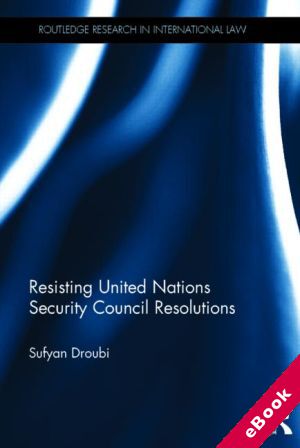
The device(s) you use to access the eBook content must be authorized with an Adobe ID before you download the product otherwise it will fail to register correctly.
For further information see https://www.wildy.com/ebook-formats
Once the order is confirmed an automated e-mail will be sent to you to allow you to download the eBook.
All eBooks are supplied firm sale and cannot be returned. If you believe there is a fault with your eBook then contact us on ebooks@wildy.com and we will help in resolving the issue. This does not affect your statutory rights.
The United Nations Security Council has primary responsibility for maintaining international peace and security. In discharging its powers it must act in accordance with the Purposes and Principles of the UN, and observe the rules governing voting and procedure established in the Organisation's Charter. The Council adopts mandatory resolutions that establish obligations for members and non-members. Such obligations trump conflicting obligations originating from treaties and Member States must cooperate with the Organisation and among themselves, in the implementation of any action prescribed by the Council against States whose behaviour the Council considers an act of aggression, or a threat to, or breach of, international peace and security. Since the adoption of the Charter, observers have tried to grasp the scope and extent of the Council's powers, and whether States have any right to oppose its mandatory resolutions, especially those they find to be unlawful, i.e. contrary to the Charter.
This book analyses resistance to Security Council resolutions and puts forward a theory of lawful resistance. Sufyan El Droubi takes a positivist approach to the UN Charter regarding it as a constitution, with the meaning of Charter provisions considered to be the product of an on-going dialogue between international lawyers, UN staff, government lawyers, diplomats and scholars. Special emphasis is placed on the construction of the Charter's meaning through the practice of both organs and Members of the UN. The book explores a number of case studies of individual and collective State resistance to mandatory Council resolutions, expressly justified by the alleged unlawfulness of the opposed resolution. The book develops the concept of lawful resistance including the cues of unlawfulness upon which the resisting State can rely so as to assess the lawfulness and legitimacy of its arguments, the role played by the different actors present in the different contexts of resistance, as well as the contours of behaviour that may qualify as lawful resistance.